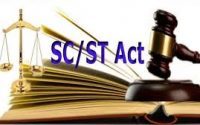Reporting public views on judicial corruption isn’t contempt: SC
Source:- indianexpress.com
The Supreme Court Tuesday observed that a report based on public views regarding corruption in judiciary may not invite contempt of court action and that such surveys instead gave opportunity to address the malady in the system. A bench led by Chief Justice of India J S Khehar said that the law of contempt would not ordinarily encompass individuals or organisations which interview people and compile their views on whether judiciary was also afflicted with corrupt practises such as bribing and exercising influences.
“How do you understand society? You raise questions; ask people in the society; record their views and then compile it to see how people think…what is their perception of a particular institution or an issue. Where will research go if this is contempt?” questioned the bench also comprising Justices D Y Chandrachud and Sanjay K Kaul.
It added that collection of data by individuals or organisations would not invite contempt. “Are you saying that if there is a malady, whether it is expediting a case or delaying it, and other such acts, should we close our eyes? If somebody collects data, we think, someone should look at it closely and find ways to remedy the problems,” it added.
The court was responding to a submission by the counsel for Jammu and Kashmir government who had sought to defend a show-cause notice issued to Transparency International (India) and Centre for Media Studies (CMS) for releasing a damning report on corruption in the state’s subordinate judiciary.
This report was based on a survey of litigants and more than 90 per cent of respondents complained of corrupt practices, which included bribes to delay cases or assign them to other judges, to lose or misplace files, for opposing lawyers to work against the interest of their client, delay in execution of court orders, lack of public access to records of court proceedings and delay in delivery of judgments.
After Greater Kashmir, a J&K-based newspaper, published this report, a judicial magistrate in Kangan issued a show-cause notice to the chairman of Transparency International and CEO of CMS in May, 2006. The notice was issued under provisions of the Contempt of Court Act as well provisions of criminal defamation. The oganisations sent their replies but did not appear in the court, which later issued arrest warrants against their heads in August 2006. After an appeal against this order was filed, the apex court stayed the warrants as well as further proceedings in the matter.
As it finally heard the case on Tuesday, the court agreed with senior lawyer Jayant Bhushan, who represented the organisations, that the magistrate could not have issued arrest warrants for want of jurisdiction since the power to initiate contempt was with the High Court only. Under the law, a subordinate court can only make a reference to the High Court for initiating contempt of court action. It quashed the orders of issuing warrants.
The bench also said that the organisations had correctly understood the tenor of the show-cause notice that it was only to help the magistrate get their side of story too in order to finally decide whether to make a reference to the High Court for initiating contempt.
But it rejected Bhushan’s plea that since the report was not confined to the subordinate judiciary, there was no reason for the J&K magistrate to feel aggrieved. According to the court, any magisterial court could feel wronged by the assertions in the report and make a reference to the High Court for deciding whether it amounted to contempt or not.
The bench then referred the matter back to the magistrate for hearing it afresh from the stage of issuing the show-cause notice and decide the future course of action strictly in accordance with the law. The court said the organisations could appear before the magistrate in-person or through their counsel to explain their position.



